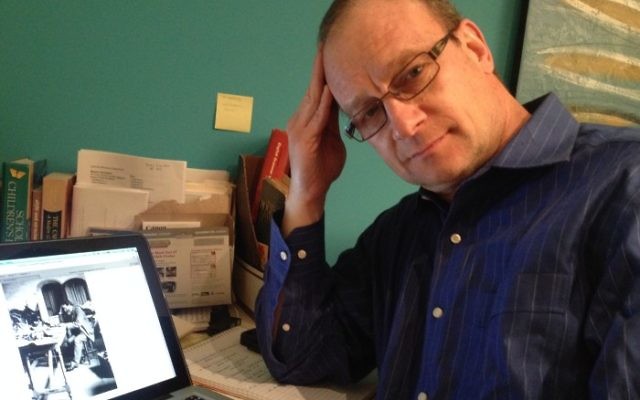Speeding Past History
Do motorists streaming past the Leo Frank Memorial know who he was and why he is important?
Dave Schechter is a veteran journalist whose career includes writing and producing reports from Israel and elsewhere in the Middle East.
I doubt that motorists speeding along Roswell Road at sunset on Aug. 17 noticed that a few dozen people were gathered on the south side of the Interstate 75 overpass, on a sidewalk near the parking lot of a Mexican restaurant.
I wonder if any of them have ever pulled into that parking lot, walked across the grass to that sidewalk, and read the words engraved on a historical marker or on a small monument a few feet away.
The marker remembers Leo Frank, the only known Jewish victim of a lynching in the United States.
Frank was the superintendent of the National Pencil Company factory in downtown Atlanta, where, on April 16, 1913, the body of 13-year-old Mary Phagan, an employee from Marietta, was discovered at the bottom of an elevator shaft. Three days later, the 31-year-old transplant from New York was arrested and charged with murder.
Frank was convicted in August — after a highly-charged trial, in which crowds outside the courthouse yelled “Kill the Jew!” The prosecution’s chief witness, a janitor who claimed to have seen Frank with the girl’s body, may himself have been guilty. Nonetheless, Frank was sentenced to death and sent to the state prison in Milledgeville.
Frank was scheduled to be executed by hanging on June 22, 1915, but the day before, Georgia Gov. John Slaton commuted his sentence to life in prison. Late on Aug. 16, a cabal of men from Cobb County — angered by the commutation — kidnapped Frank from prison, drove to the woods in Marietta, and in the early hours of Aug. 17, hanged him.
The historical marker is a stone’s throw from where Frank was lynched, near Frey’s Gin Road. The forest is gone and today, that history sits beneath highway pavement.
I wonder how many of those motorists could tell you who Leo Frank was and why he is important. The people assembled on that Thursday night knew; perhaps none so well as Rabbi Steve Lebow, the most vocal advocate on behalf of a full pardon for Frank.
Lebow began the service marking Frank’s 108th yahrzeit by repeating words that he spoke eight years earlier, at the rededication of the marker, which the Georgia Department of Transportation had kept in storage as the highway interchange was expanded. “Leo Frank was innocent. And those four words have eluded polite conversation in Atlanta and in Marietta for over a century,” he said.
In 1986, the Georgia State Board of Pardons and Paroles issued Frank a posthumous pardon — without addressing the issue of guilt or innocence — on the grounds that he was denied due process when he was kidnapped from prison and lynched.
I wonder how many of those motorists could tell you who Leo Frank was and why he is important. The people assembled on that Thursday night knew…
The Frank case traumatized Jewish Atlanta for decades, perhaps until The Temple bombing in October 1958 — “the bomb that healed,” as Janice Rothschild Blumberg called it — when government officials and private citizens voiced support for the Jewish community.
When Lebow came to Marietta to lead Temple Kol Emeth in 1986, he was aware of the Frank case, but it was a few years until he realized where the lynching took place. Lebow came to understand — and embrace — the significance of being a rabbi in Marietta given that history.
Lebow retired from Temple Kol Emeth in 2020 and is now senior rabbi of both Temple Rodeph Shalom in Rome and Sholom b’Harim in Gainesville.
For many years, he has come and — no matter how many or how few join him — recited the Mourner’s Kaddish for Frank.
This year, he had plenty of company, including several rabbinic colleagues. Blake Singer, the Cantorial Soloist at Temple Kol Emeth, chanted “El Maleh Rahamim,” a prayer for the soul of the deceased. The rabbis in attendance led the recitation of the Kaddish.
I doubt that those motorists on Roswell Road noticed the Marietta police officers quietly walking about the area. This was a Jewish gathering and, in the world, as it is today, Jews take a risk by assembling in public, so a police presence at such events now is routine. Indeed, the Jew haters who have leafleted area driveways and protested outside a local synagogue have made labeling Frank as a pedophile a prominent piece of their poison.
Lebow also made certain to point out that just steps away from the Frank marker is a small black granite monument, dedicated in December 2018, a memorial to the 570 (or more) African Americans lynched in Georgia between 1880 and 1946.
The yahrzeit service for Leo Frank lasted a little more than 15 minutes.
Fifteen minutes to remember the only known Jewish victim of a lynching in the United States.
Fifteen minutes to renew the call for exoneration of a Jewish man wrongly convicted.
- From Where I Sit
- Opinion
- Dave Schechter
- Leo Frank Memorial
- Lynching
- National Pencil Company
- Mary Phagan
- Gov. John Slaton
- marietta
- Freys Gin Road
- Rabbi Steve Lebow
- Georgia Department of Transportation
- Georgia State Board of Pardons and Paroles
- The Temple
- Janice Rothschild Blumberg
- Temple Kol Emeth
- Temple Rodeph Shalom
- Sholom b’Harim
- mourner’s kaddish
- El Maleh Rahamim
- Blake Singer




comments